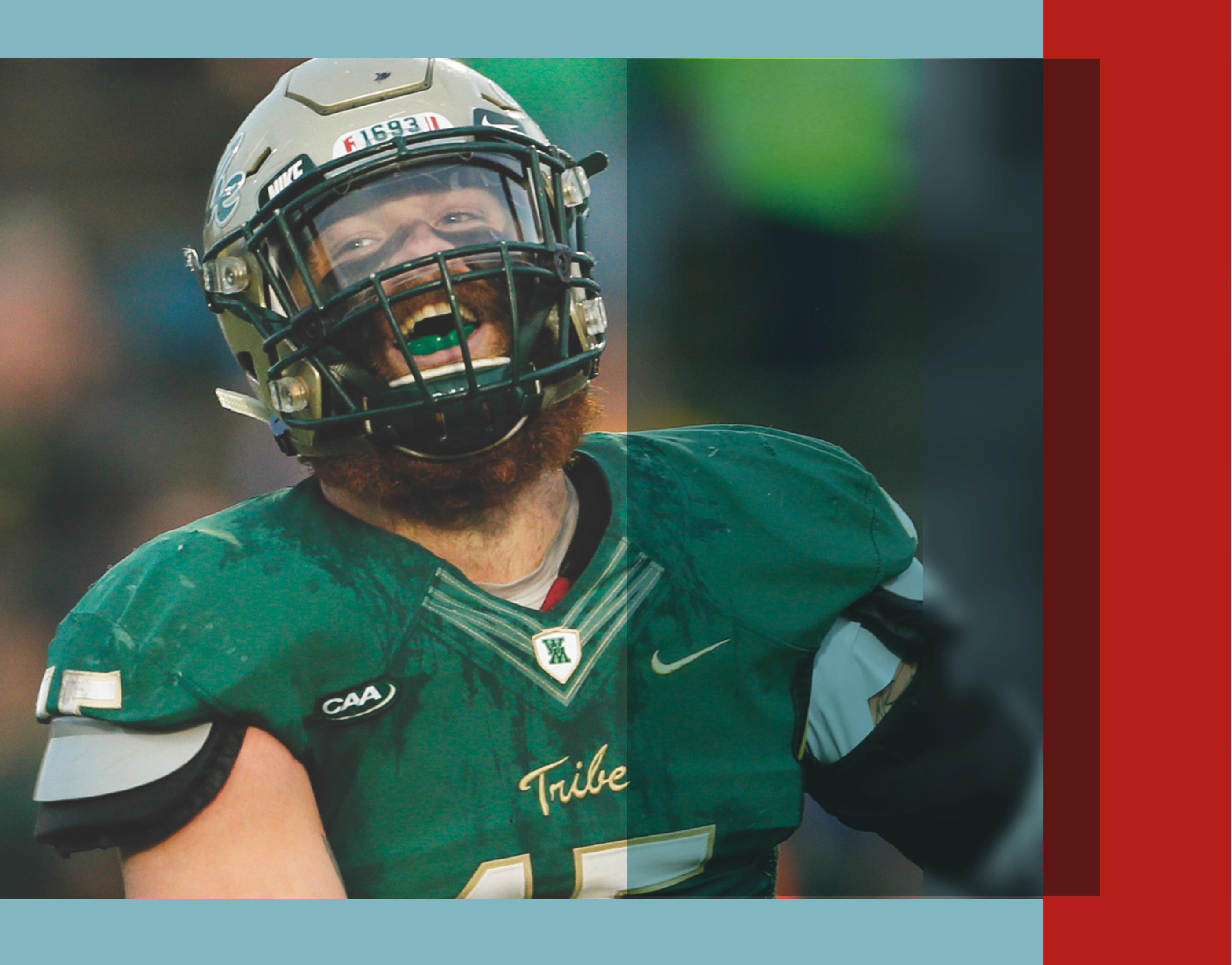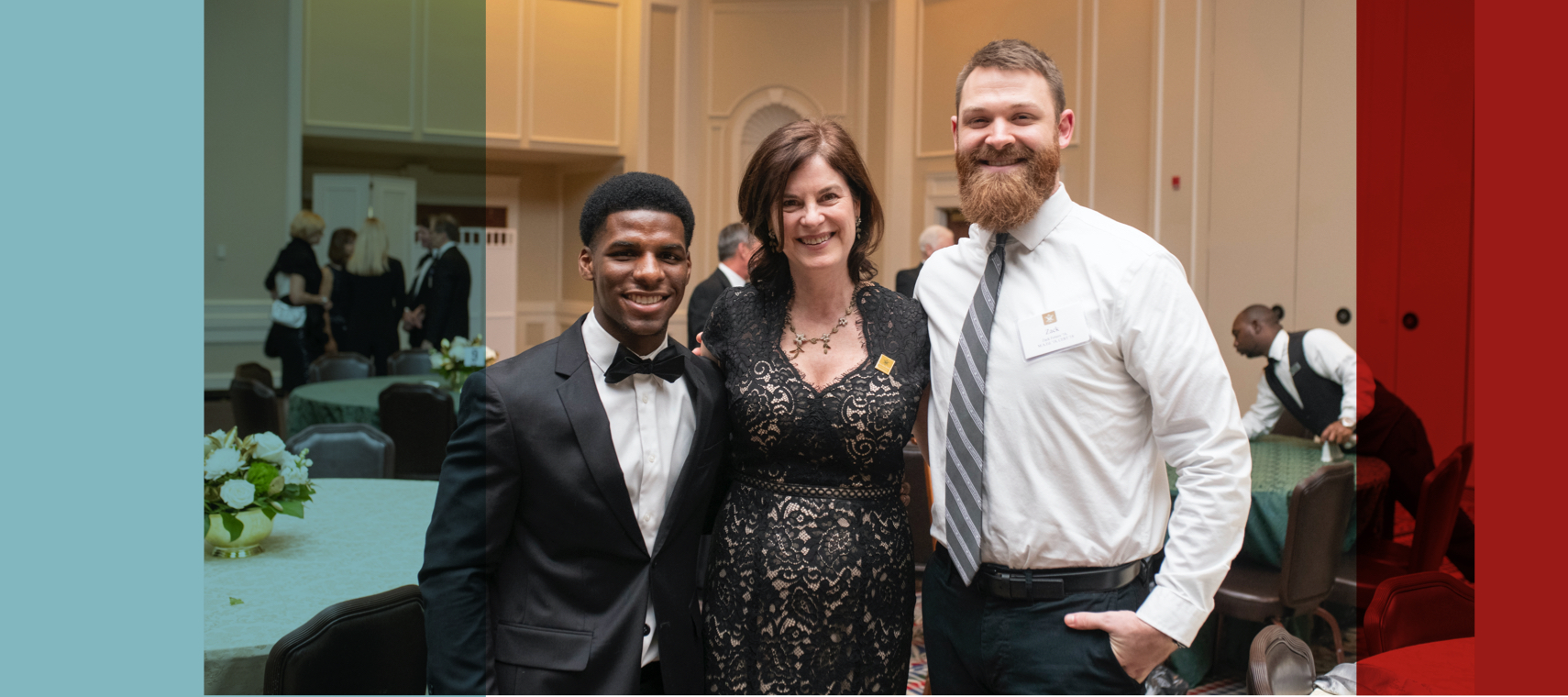Back to School
Zack Fetters' path from the gridiron to grade school
June 8, 2020
By
Noah Robertson '19
Back to School
Zack Fetters' path from the gridiron to grade school
It's morning, and Zachary Fetters ’16, M.A.Ed. ’18 is dressing in uniform: a pair of slacks and a polo shirt, short enough to show off his left arm's full-sleeve tattoo. After grabbing a packed lunch, he takes the short drive to the indoor-outdoor campus of Laurel Lane Elementary School in James City County, Virginia. Fetters, who once charged wildly through stadium tunnels, walks quietly to the classroom.
A full day with students awaits. The game is about to begin.
A former Tribe football player of five years and college-level coach, Fetters is now a special education teacher, working just miles away from his two-time alma mater. At 6'3" and 230 pounds, he still fits the mold of the sport he’s played since childhood. But at school, this bearded Paul Bunyan in chinos has found a home for which he’s prepared almost his entire life, though he didn’t always know it.
Few Division 1 linebackers who major in philosophy end up becoming special education teachers. Though seemingly tailor-made for the field, Fetters has come to learn he was born for the classroom — helping to fill a critical teacher shortage in the state. His journey to Laurel Lane, as surprising as it was at first unintended, comes from a lifetime of relationships with family, coaches, professors and colleagues. It involved changed plans and hard questions — most of all imagining a life without football.
But while he may no longer play his lifelong sport, Fetters applies the lessons it taught him in his career. The exuberance, discipline and dogged will to win still remain; it’s just a different game. He’s now on a team of teachers. Winning is all about helping students achieve better outcomes. The end goals are much more long term.
Fetters has traded in his spandex for slacks, his pads for polos, and his helmet for an unconcealable smile at work. He’s found a new competition, and while he may be new to the game, he’s ready to play on.
For almost as long as he can remember, Fetters’ life was about football. Having played since the age of 7, he sampled every position on the field except for center. He finished high school as quarterback for his hometown team in Gaithersburg, Maryland, recording 40 touchdowns his senior year.
This exceptional play on the field led Fetters to William & Mary. Visiting campus, he remembers the university feeling completely different than any other school he’d seen — and learning, for the first time, that both his parents were alumni. When former coach Jimmye Laycock ’70 offered him the chance to come and play at whatever position
worked, Fetters joined the Tribe.
That decision kickstarted a five-year football career that spanned both sides of the ball, taking him from receiver to tight end to linebacker. In his time on the team, Fetters recorded tackles, interceptions, fumble recoveries, kick returns and touchdowns — versatility that would come to help him later on.
“The transitions led me to really embrace the whole picture of the game and discover how each step could help me with the next step,” he says. “It was just learning. I love learning. I’m definitely a nerd.”
Football, in Fetters’ opinion, is not a contact sport. It’s a collision sport. Playing it for so long took a certain level of craziness, he says, but it also taught him to focus his energy, which he calls having a “cool head and a hot heart.” To balance those two, he maintained at every game a sense of childlike joy. Yes, the sport was about winning, but it was only a game, and games should be fun.
After graduating, Fetters went to Stevenson University near Baltimore for what he thought would be the start of a long career in coaching. His first year there was almost perfect, he says. Still a young program, the team won their conference championship and advanced to the playoffs. He was even working with players at his old position of linebacker — a rarity for graduate assistants so young. But at the end of the season, something felt off.
“I kind of looked at it and thought this could not have been a better first year of coaching. And it still feels like something’s just missing,” Fetters says. “I had thought my whole life that it was going to be football one way or another, whether it was playing, coaching or commentating. I just remember sitting in the locker room and thinking, ‘What would I have pursued had I never played football?’”
Then, he thought of John and Sam — his half-brothers. At the age of 10, Fetters became an older brother when his stepmother delivered twins. His life suddenly changed forever.
Two of the most caring people he knows, the twins complement each other. John, the elder, is full of energy and loves to be around people, even if he usually stays quiet. Sam, on the other hand, is more voluble, loves to run and is a natural leader. John hacks iPads; Sam competes in the National Spelling Bee. Both have participated in research conducted by National Geographic, and both served as the best man at Fetters’ wedding — Sam gave a short, powerful toast that left the room in tears.

Both John and Sam also have autism, and throughout their lives have made great strides in their social and communication skills. It was this that came to mind during Fetters’ search for life beyond football. He began to see his family in a completely new way. No matter the start of his journey, John and Sam were now the destination. Zach’s future lay in helping students like his brothers.
This realization led him back to his other home in Williamsburg and has kept him there since. Through scholarships enabled by the For the Bold campaign, Fetters returned to William & Mary for his master’s degree in special education to begin a new career in teaching.
After a year at the high-school level — for which he won the Williamsburg-James City County school district’s Rookie Teacher of the Year Award — Fetters transitioned to elementary school and Laurel Lane, where he could put the childlike joy he practiced on the field to use every day.
Unlike other elementary schools in the area, Laurel Lane is a campus, with round buildings connected by covered outdoor walkways. The school, says Principal Karen Swann ’02, M.A.Ed. ’06, is made special by the students, who love to work and play hard.
Swann, who smiles when talking about her school, uses sports metaphors to describe their work. The staff is like a team, and winning involves bringing the best out of each other and their classes. The faculty’s motto is “all in for all our students” — or “penguins,” given their mascot.
Working in special education, she says, requires a particularly robust commitment, one she sees so often from Fetters, whether he’s tutoring students one-on-one or playing with large groups at recess outside. Being “all in” when serving students with learning disabilities requires patience and empathy. It takes a focus on slow, long-term successes, some of which a teacher may not see for years.
“He believes that every child can learn, and when you have that at the forefront of your mission, the opportunity to learn increases,” she says. “Kids will let down their guard. Kids will take risks. Kids will engage because they know someone believes in them.”
When it comes to special education, says William & Mary Professor of Education Debbie Ramer, that belief in every student is even more important. The nature of the job is intervening on behalf of students when school is not always a happy or successful experience, she says. Students and teachers can put in a lot of effort, but effort doesn’t always turn into results.

In addition, there are a number of pervasive and dangerous misconceptions about special education itself, says Ramer, who taught Fetters while he earned his master’s degree. Most problematically, the public often assumes that special education teachers only work with students who have significant behavioral disabilities, an assumption that contributes to a widespread fear of the field, she says.
Put together, she says, those reasons contribute to an exceptionally high burnout rate among new special education teachers: 90% within the first five years. There’s already a nationwide shortage of educators, especially among men, who make up only about 11 percent of the total number of the country’s elementary school teachers, according to the National Center of Education Statistics. Those two together make committed, fully licensed teachers in the field — such as Fetters — not only rare but also an extremely hot commodity, says Ramer.
Many of the students Fetters works with, she says, may not have a strong male role model in their lives. Having a gentle giant like Fetters, with a “teddy bear heart,” says Professor Ramer, is invaluable when so few are available in the classroom.
“Zach’s a rock,” she says. “He’s a rock for those kids. He’s a rock for his colleagues. He is so positive and has such a loving heart. And that is something that will take him far and will allow his students to be very successful.”
Fetters has a somewhat unorthodox response to the challenges involved in his job: one day he too no longer wants to be a special education teacher, but for a different reason than most. His goal is to do his job so well that his line of work is no longer necessary.
“The goal is to put ourselves out of a job, meaning that our whole job is to get students not to need us,” he says.
That goal is often hard, Fetters says. You develop a relationship with students only to see them less and less, as they become more and more independent. He’s seen students who once needed him every half hour learn to become comfortable working alone.

But teaching, Fetters says, was never about him. Every small step his students make is, in his eyes, a huge victory, as they learn to become successful on their own. It’s his greatest proof that he’s doing his job well, even if it means he sees them less often. That, for him, is winning the game.
As a natural competitor, Fetters wants the best outcomes possible for each of his students all the time. In his two years as a teacher, though, he’s come to learn there are times when you just don’t win. Accepting that has been one of the most difficult things about his young career so far, but also one of the most liberating. He loved pressure situations on the field, but in education, the stakes are much higher. It’s no longer about tackles or touchdowns. It’s about students’ lives.
“In education, there’s a lot of pressure,” he says. “And when you just free yourself from that pressure and say you’re going to give everything you can today for these students, you can walk out with your spirit in a good place and shake off some of the challenges just a little bit easier.”
Fetters’ personal motto when it comes to his line of work is “walk in freedom,” which he believes serves as a reminder to “take each day at work as a gift that you get to spend with some awesome little humans.” That approach, he says, helps him find peace even when work is challenging or stressful, a kind of peace he learned from his years of practice at home.
At family get-togethers in the Fetters household, the first thing they reach for is the Nintendo Switch. Someone (usually Sam) brings players out into the living room and organizes tournaments of Super Smash Brothers or Mario Kart. Thus the games begin.
“It’s just a great picture of connection, where we can all just get together and do the same thing in the same little world,” he says of their family tournaments.
Zach says he usually wins, but Sam took home gold in their last Mario Kart Grand Prix. As a fulltime teacher and new parent, Zach doesn’t get as much time to practice. Meanwhile, his brothers are getting better, and older, as they turn 16 this year — something Zach can barely believe.
Now living in different states, Zach and his brothers don’t get to see each other as often as they would like. But that doesn’t make them any less influential on Zach’s life. They prepared him for his career now. Every day at work, because of them, he’s able to better empathize with his students and value patient, consistent growth. Watching his students grow older and more self-sufficient is like watching his brothers do the same, even if it means losing more often at Mario Kart.
Life after graduation hasn’t gone according to plan for Fetters, but one thing that’s held steady is the value he places on relationships. Family, professors, coaches and friends prepared him for where he is now, so he can do the same for his own family, with his own students, just as he was taught. For him, it’s all about giving to others the same things he was given.
One of Fetters’ favorite things to do with his students in the classroom is to play games designed to develop skills that will help their social interactions, memory and planning. When playing, he says, he thinks about their different gifts and how they can individually grow through them. The one thing he consistently recognizes in all of them is kindness. Helping bring out that innate joy in them is, for Fetters, winning the game.
“My students are some of the most tenderhearted, sweetest kids to work with,” he says. “And each day I get to ask how I can teach them to let that shine in their communities so that they can make their own positive impacts. I think that in itself is just the biggest gift of all.”